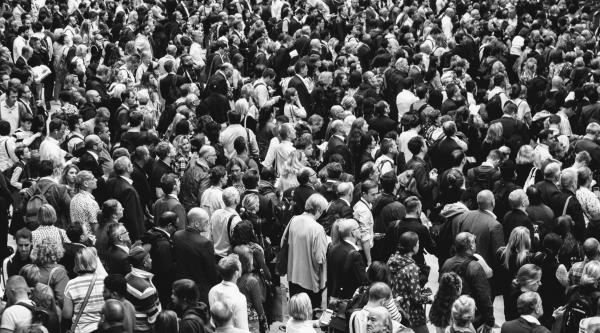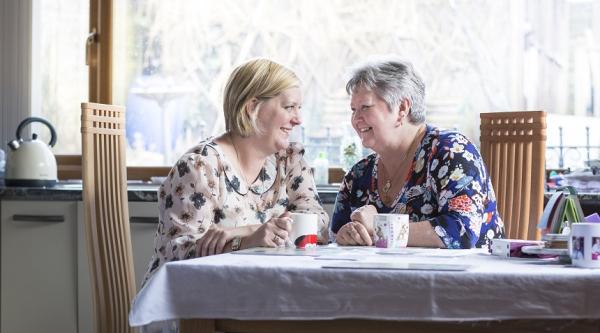Dementia and coronavirus risk
People with dementia are at greater risk of complications from coronavirus. This page has information on catching and becoming ill from Covid, and how to reduce the risk for people with dementia.
1. Catching Covid while living with dementia
People with dementia are more likely to catch coronavirus.
Risks for people with dementia at home
A person with dementia who has memory problems or confusion may struggle to remember how to keep themselves safe from coronavirus.
This includes frequent handwashing and keeping their distance from others where possible.
This may mean that, without help to stay safe, someone with dementia may be a bit more likely to become infected with the virus.
If someone has paid carers coming in and out to support them, this may also make the person more likely to catch coronavirus.
The carers should not stop coming, but should use protective measures like an apron, mask and gloves.
Risks for people with dementia living in residential care
People with dementia in a care home are at higher risk of getting coronavirus.
This is partly because frailer, older people have weaker immune systems that are less able to fight off infections. It’s also because people in care homes live very closely together.
The person may easily catch coronavirus from another resident, from a care worker, or from a communal surface with the virus on it.
2. Severe Covid illness for a person with dementia
If a person with dementia does catch coronavirus, including any of the coronavirus variants, they are at higher risk of getting worse Covid illness.
The risk of severe symptoms rises steeply with age, and nine in 10 deaths from Covid have been in people over 60.
Certain long-term health conditions also significantly raise the risk of severe illness. Some of these – heart or blood vessel disease and diabetes – are more common in people with dementia.
3. Does Covid make dementia worse?
Infections such as coronavirus can cause a person’s dementia to get worse more quickly. With rehabilitation, it’s possible that the person can get some abilities back, although some deterioration will be permanent.
When Covid does make dementia worse, this probably has several causes:
- the virus gets into the brain and damages more cells there
- delirium is a symptom of Covid in people with dementia and can lead to worse symptoms such as confusion or loss of ability
- long Covid can cause problems with memory or concentration (‘brain fog’)
- invasive ventilation (use of tubes to help the person breathe) or intensive care worsen confusion.
4. Reducing Covid risk for a person with dementia
While coronavirus is still in circulation and variants of the virus continue to emerge, it remains important for a person with dementia to keep safe and minimise risk.
Vaccines
The best protection from Covid is having the coronavirus vaccinations. People who have had the vaccine are much less likely to become seriously ill from coronavirus. Vaccines also help stop you passing coronavirus on to others.
We have more information about Covid vaccines for people with dementia.
Washing hands
It is still crucial to keep hands clean to help stop coronavirus spreading. If the person with dementia has memory problems or is confused, they may forget about aspects of hygiene. Try these tips to encourage them to stay safe:
- Print out reminder signs or posters and put them up near hand basins.
- Use digital devices to set reminders such as: ‘It’s time to wash our hands’.
- Wash hands with the person to encourage them – maybe sing a song together.
- Break the task down into simple steps if this makes it easier to follow.
- Focus on the details and senses and talk to the person while handwashing
- Taking note of what’s going on immediately around the person – ‘living in the moment’ like this can help with anxiety too.
- Use a bar of soap if someone is less familiar with liquid soap – in a different colour to the sink.
Fresh air
Coronavirus is passed on much more inside than outdoors. It is especially important to make sure that there’s a supply of fresh air into indoor spaces when someone in the household has coronavirus or someone visits.
Face coverings
Wearing a face covering helps stop you spreading coronavirus to other people, especially in places where people are closer together such as shops or on public transport.
Some people, including those with dementia, choose to wear a face covering when walking outdoors – it can make them feel safer.
It is no longer a government requirement to wear a face covering, but you may still have to wear them in some settlings such as hospitals. NHS guidance also recommends that you wear a face covering around other people if you have Covid orsymptoms of Covid.
If the person finds wearing a face covering difficult, try to understand why. Try the following tips:
- Be patient and offer encouragement
- If the person forgets why face coverings are needed, you may need to gently remind them that they or someone else has Covid. Consider a sign up by the door for when you go out.
- Check if the mask fits comfortably
- Talk to them to understand their feelings around wearing a mask.
- Are they unhappy with the feel of the fabric? Try some different materials, maybe one made from a familiar garment (check with them first before cutting the fabric).
- Do they pull the cover down? Try some distraction or positive reinforcement – how wearing a face covering helps to stop the spread of coronavirus and keep people well.
- Are they anxious it will stop them breathing? Offer reassurance and show them that it won’t.
Is there a past experience that might make them fearful about wearing a mask (perhaps as a young child in the war)? Talk to them about it and try to find ways to reassure them.
If these suggestions don’t work, and wearing the mask would cause the person distress, then you are able to give this as a reasonable excuse for the person not to cover their face if they are asked to do so.
Symptoms, testing and treatment of coronavirus
Older people and people with dementia are more likely to become seriously ill with coronavirus (Covid). Our information summarises symptoms of coronavirus, tests and diagnosis. It also covers support for a person with coronavirus.
- Page last reviewed:







